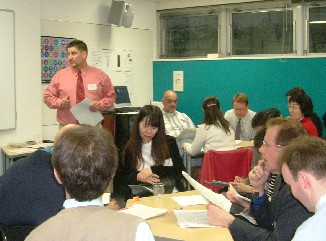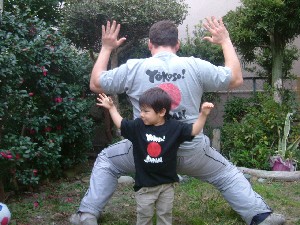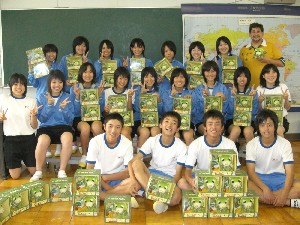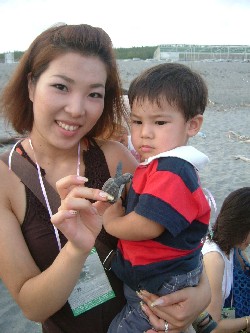
I met Jon Dujmovich at a cross-cultural communication workshop in Amsterdam back in 2004. It was a workshop in which people gathered from all over the world to meet in the Dutch capital, because in one way or another they were all interested in, or related to, intercultural relations management. As always happens in a group situation, some people grabbed my attention more than others, some remained vividly in my memory and some I even met again somewhere in the world after the workshop. Jon is a person you hardly forget; a Canadian with a broad smile and a warm and immediate way of communicating. His contribution to the workshop was remarkable; indeed Jon lives in Hamamatsu, Japan, where he founded Imagination Ink, creative education and entertainment, so naturally his expertise in cross-cultural communication needs no further explanation. I only got back in touch with Jon last year, and decided to interview him for this special up-dating about Japan. All in all, I think it was good to wait some years before contacting Jon again. During this time he has accomplished, invented, created, made and planned so many interesting and stimulating things that I cannot imagine what it would be to interview him again in, say, five years!!!!! Read and believe…
Jon Dujmovich was born and grew up in Nelson B.C, Canada, in a family which is a bit of a multicultural mosaic in and of itself: his mother has a Swedish/Canadian background whilst his father came from Croatia. Besides, the town where Jon grew up is home to a vast community of second or third generation Japanese. One of his teachers in primary school was Japanese (he admits having had a bit of a crush on her), and all this might explain why Jon has always felt an attraction for the country of the Rising Sun.
 Indeed, after completing university Jon decided to join a friend who was living in Japan and see for himself what it was like living there. He spent one month in Japan, in springtime, and then decided to look for a job and settle down. He makes it sound like a very smooth and easy decision and process, and at my surprise he explains that “it was not as difficult at that time as it is now. As a foreigner teaching English, you could always find some opportunities. I was in a teaching programme in Canada so teaching was really what I wanted to do. In Japan they have Juku schools, i.e. cram schools that children attend after regular schools, and that’s where I started. I settled down in Hamamatsu straight away. The city being exactly in the middle of Japan, I figured out it would be a lot easier for me to travel all over Japan from here”.
Indeed, after completing university Jon decided to join a friend who was living in Japan and see for himself what it was like living there. He spent one month in Japan, in springtime, and then decided to look for a job and settle down. He makes it sound like a very smooth and easy decision and process, and at my surprise he explains that “it was not as difficult at that time as it is now. As a foreigner teaching English, you could always find some opportunities. I was in a teaching programme in Canada so teaching was really what I wanted to do. In Japan they have Juku schools, i.e. cram schools that children attend after regular schools, and that’s where I started. I settled down in Hamamatsu straight away. The city being exactly in the middle of Japan, I figured out it would be a lot easier for me to travel all over Japan from here”.
Thinking of a young Jon Dujmovich without a word of Japanese arriving in Hamamatsu and starting a whole new life there is quite interesting. But what is amazing is to realize what a fascinating company Jon has set up, how much he has accomplished and how integrated he is into Japanese life. I ask him how he came to the decision to “go independent” in his job:
“I liked my work as a teacher a lot, but I came to a point where I realized that I would be more creative if I were on my own. Year by year I gained my independence, I met my wife (a Japanese) and we decided to start a business together. At that point I had worked for 3 years in the education and language training dept of National Panasonic, who had designed the Excel Gold programme for language education, defined by the Wall Street Journal as one of the best programmes for company training. This is where I started my first training as intercultural trainer. I was assigned to a group of Japanese due to go to the Czech Republic for work, and I had to train them in intercultural working relations plus the Czech Republic. So there I was, a language teacher teaching a group of Japanese about the Czech Republic!”.
What a start!!! But it proved very fruitful indeed. Jon genuinely enjoyed the experience, and decided to continue in the direction of intercultural training.
 This is where Imagination Ink comes into the picture. What Jon has created is a company that provides creative education and training courses combined with promoting intercultural events. It provides language teachers to companies and schools in the area, most for English but also for Chinese, French and Portuguese. They do translating, interpreting, and arrange different sorts of events.
This is where Imagination Ink comes into the picture. What Jon has created is a company that provides creative education and training courses combined with promoting intercultural events. It provides language teachers to companies and schools in the area, most for English but also for Chinese, French and Portuguese. They do translating, interpreting, and arrange different sorts of events.
“This is the fun part of it”, says Jon. “When in Canada I worked for a while in arranging events, and this is what I like to do also here: using creativity and imagination in intercultural events, food fairs, in all sorts of different parties and festivals that abound in Japan”.
There is actually a lot going on at Imagination Ink, and what is even more fascinating for me is that this kind of job opens up an incredible variety of opportunities to express one’s imagination. And that is exactly what Jon has been doing in the last few years. With creativity, optimism and passion, and while continuing to “juggle many hats at the same time”, as he puts it, Jon has developed quite a number of interesting cross-cultural projects in his area. In particular he mentions “The world in my neighbourhood”:
“With this project I am designing a course for 15 year olds in a local public junior high school. I am trying to increase their intercultural sensitivity and bring them closer to the diversity found in the community. There are for instance a lot of Brazilians living here along with other nationalities, and that makes Hamamatsu a unique place in Japan. One of the things I used for expanding the student’s world was the ‘Ocha-ken Project‘. Ocha means green tea, and this area is famous for its green tea; ken means dog, but it can also mean prefecture.
I contacted Sega Toys explaining the idea I had in mind, and we got a bunch of stuffed dogs. Each student got two Ocha-ken dolls, and took it home to simulate a home-stay, during which he/she had to keep a journal (in English, of course, let’s not forget that this happened within an EFL course!). The dog was then brought back to class, and the students summarized their journal in a single paper, attaching a couple of photos. They had then to prepare the dog for travelling, prepare its bag and put a souvenir into it plus instructions about what to do with the dog.
I packed all the dogs and took them to the Intercultural Communication Institute in Portland, Oregon, where I was heading for a summer course on Intercultural Communication. I thought this would be the perfect platform to explain the project. I distributed the dogs amongst the people there, and now we receive pictures, letters and post-cards about the dogs from all over the world. Every time a piece of information comes in, we put it on a school wall dedicated to the project, and we also set up a Facebook group“.
“There are still lots of other interesting activities we set up; we invite guest-speakers, organize excursions… I recently organized a day trip downtown, the purpose of which was for students to see what it means for a foreigner to move to Hamamatsu and for them to travel abroad: we first visited the immigration centre, then went to city hall, which is where foreigners have to get a registration card that they must carry at all times. We then went to a local foundation that helps in the process of settling down, providing free legal advice, translations, providing information to foreigners. Everyone was extremely kind and explained the whole process foreigners have to go through when settling down.
Then I wanted to show them the opposite: we went to the passport office to get their passport, followed by a simulation trip to an Indonesian restaurant. I decided to do so after doing a pre-study amongst my students, and realizing that not one of them had ever tasted this particular ethnic food. It was very nice, they had Indonesian food (that some found too spicy….), talked a bit about Indonesian culture, etc.”
To my eyes, Imagination Ink is like a huge roof under which everything connected with genuine intercultural interest can find its place. I ask Jon whether it was difficult to set all this up, and to keep it going, whilst being very busy in a variety of activities and developing a wealth of ideas.
“As for getting projects started, we had to go through a lot of paper work required by Japanese bureaucracy, but what’s most delicate is that building relationships takes a lot of time and trust. My wife is actually my paper boss. She is the one that takes care of book-keeping and administration. My dream is to have a flexible job, so that I can continue moving from one area to another”.
I can see, though, that the field where Jon moves most happily is the one of intercultural communication at its purest point of creativity. Indeed, besides the intercultural activities Imagination Ink carries out, Jon is also a graduate student doing a Masters in Intercultural Relations with the Intercultural Communication Institute in Portland. Besides that, he will soon start lecturing at two Japanese universities, teaching culture in English.
Even without these last two hints about his development as an intercultural trainer, my admiration for Jon’s capacity of generating constantly new ideas (and putting them into practice!) has skyrocketed. And now Jon tells me that a recent change in Japanese policy towards foreigners inspired another “little” project that he is dutifully developing: the “Yokoso Japan 11/20 Commemorative T-Shirt” project. The idea came to him after the revised Immigration Control and Refugee Recognition Act took effect on November 20th, 2007. According to the Act, all foreign nationals (including residents) entering or re-entering Japan must leave their fingerprints and be photographed. Jon decided to become politically active and protest against this unjust treatment of foreign residents, and designed a T-shirt that you can see in the picture, that says “Yokoso Japan”.
 “We encourage people to wear the T-shirt when passing through immigration procedures at Japan customs and immigration control to show indignation against this measure, which bothered me a lot. I have just obtained permanent residency, am married to a Japanese national and have a family here. I mean, this is my home!! Would you want to go through this every time you can home? It amounts to a status of second-class citizenship.”
“We encourage people to wear the T-shirt when passing through immigration procedures at Japan customs and immigration control to show indignation against this measure, which bothered me a lot. I have just obtained permanent residency, am married to a Japanese national and have a family here. I mean, this is my home!! Would you want to go through this every time you can home? It amounts to a status of second-class citizenship.”
It feels so good to hear Jon stating that Japan is his home. I am very interested in his feelings towards Japan. “I have been here so long”, he tells me. “It’s an interesting place. Trying to get into the Japanese mind-set is interesting in itself. I have always felt this love/hate fascination for this country. My interest now is in family ties, my wife and son are Japanese, his grandparents live here. Still, the interculturalist in me would like to move away one day. For a fanatic of intercultural communication it would be great to face yet another culture. We are thinking of an Arabic country, but even Europe attracts us a lot”.
Wherever you decide to go, Jon, count on Expatclic to help you. Thank you for your time and for this interesting insight about your life and your activities!






